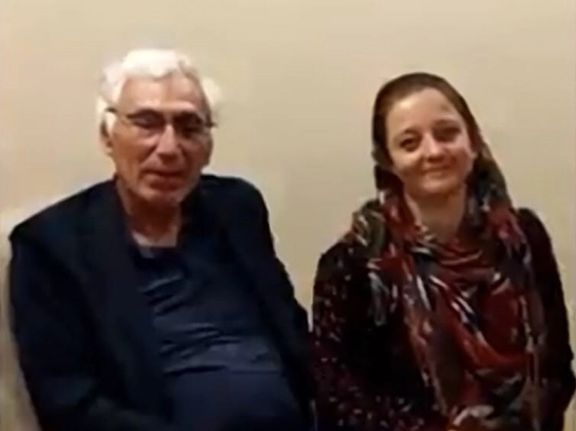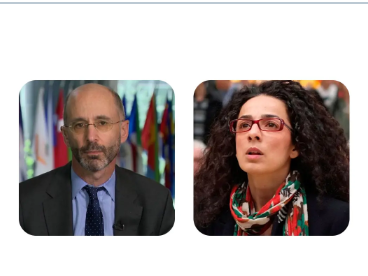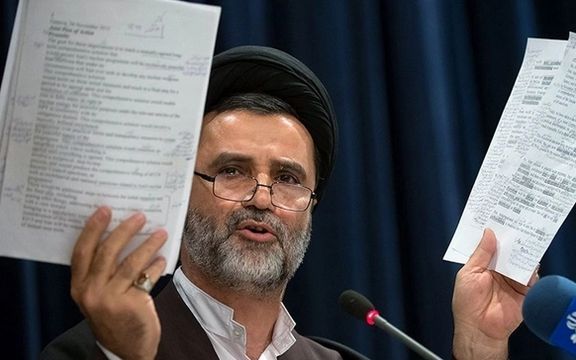Two Detained New Zealanders Released From Iran

Two New Zealanders who had been detained in Iran for the past few months have recently been allowed to leave the country.

Two New Zealanders who had been detained in Iran for the past few months have recently been allowed to leave the country.
New Zealand's Foreign Ministry announced the news on Wednesday without any further details about the two travel bloggers, identified as Topher Richwhite and his wife Bridget Thackwray of 'Expedition Earth'.
Also on Wednesday, the New Zealand government updated its travel warnings for Iran and urged New Zealanders currently there to leave the country, which is convulsed with antigovernment protests ignited by the death in custody of 22-year-old Mahsa Amini. Wellington also reiterated its call for restraint by the Islamic Republic’s authorities in responding to the demonstrations, and for greater protection of women's rights and freedom of expression.
Amid nationwide unrest and widespread arrests, several foreigners visiting Iran have disappeared, confirming earlier reports that the Islamic Republic is taking foreign citizens hostage.
Earlier in the day, The Associated Press reported that a Spanish man trekking from Madrid to Doha for the 2022 FIFA World Cup has not been heard from since the day after he crossed into Iran three weeks ago.
Tehran claims it has detained over a dozen foreign nationals since the current wave of protests began, and authorities keep repeating that the turmoil is incited by other countries. During a weekly press briefing, Iran’s judiciary spokesperson Masoud Setayeshi said more foreign nationals have been arrested in what he calls, the “case of the French spies,” adding that the newly detained individuals have been accused of “conspiracy and collusion”.

Iran says more foreign nationals have been arrested in what it calls, the “case of the French spies,” accusing them of a conspiracy to harm national security.
During a weekly press briefing, Iran’s judiciary spokesperson Masoud Setayeshi said those newly detained individuals have been accused of “conspiracy and collusion”.
However, he did not mention how many more arrests have been made and what countries the foreign nationals are from.
“In this case, other arrests have been made and the chain of information is about to be completed and will be announced as soon as it is finalized,” noted Setayeshi.
Paris lashed out at the clerical regime earlier this month accusing Tehran of the practices of “worst dictatorial regimes.”
France called the forced confession of two French nationals, arrested in May, on Iranian state TV “shameful, revolting, and unacceptable,” and demanded their immediate release.
“Cecile Kohler and Jacques Paris have been arbitrarily detained in Iran since May 2022, and as such are state hostages ... the staging of their supposed confessions is shameful, revolting, unacceptable and contrary to international law,” said a foreign ministry statement.
Iran’s state media are infamous for purported confessions by prisoners in politically charged cases. Such prisoners are held without due process of law and usually cannot chose their own defense attorney.
In a video aired earlier this month, one of the two French nationals - Cecile Kohler - said they were in Iran to “prepare the ground for the revolution and the overthrow of the regime of Islamic Iran”.
France says five of its nationals are currently held in Iran. Fariba Adelkhah, an Iranian born woman, was arrested in 2019 and sentenced to five years in prison for “undermining national security.” Benjamin Briere was also arrested in May 2020 and sentenced to eight years and eight months for espionage, without due process of law.
After the outbreak of protests following the September 16 death of Mahsa Amini at the hands of ‘morality police,’ Iran said in late September it had detained nine foreign nationals linked to unrest, including those from France, Germany, Italy, Poland and the Netherlands.
Meanwhile, several foreigners visiting Iran have disappeared, confirming earlier reports that the Islamic Republic is taking foreign citizens hostage.
Australian academic Kylie Moore-Gilbert, who was jailed in Iran for over 800 days from 2018 to 2020, said on Monday she “can confirm that the two New Zealand travel bloggers, Topher Richwhite and his wife Bridget Thackwray of 'Expedition Earth,' are missing, believed to be arrested in Iran.”
Earlier in the day, The Associated Press reported that a Spanish man trekking from Madrid to Doha for the 2022 FIFA World Cup has not been heard from since the day after he crossed into Iran three weeks ago.
Tehran denies any policy of hostage taking and insists all foreigners are tried according to legal process. However, it has frequently shown readiness for prisoner exchanges and participated in swaps in the past.
UN experts and international human rights organization say that the Islamic Republic takes foreigners hostage to extract concessions from the West.

Iranian activist Masih Alinejad has launched a campaign to gather signatures from people who believe it is time to remove US Special Envoy for Iran Robert Malley.
The online campaign, which has so far been signed by over 115,000 people on worldwide nonprofit petition website change.org since it was started on Monday, is organized as a protest to a tweet by the envoy on Sunday that said Iranian protesters want respect from the Islamic Republic. The campaign also aims to remove Malley’s deputy Jarrett Blanc.
The campaigners say while Iranians are seeking a regime change, Joe Biden’s representatives refuse to recognize their demands and their policies are fixated on a nuclear deal with the Islamic Republic.
“Iranians of all ages and social groups are protesting to replace the Islamic Republic, a religious dictatorship, with a democratic and secular form of government. Yet, President Biden’s Iran Envoy, Robert Malley, is misrepresenting the nature of the protests, pushing for negotiations with the Islamic Republic,” the campaign stated.
Malley minimized the Iran protest movement by portraying it as merely a quest by Iranians to have the government in Tehran “respect their human rights and dignity”, ignoring their call for change, Alinejad said.
Redeeming his remarks, Malley told Iran International on Monday that that his Sunday tweet on Iran protests, which led to negative reactions, “was poorly worded.”
“It is not up to me; it is not up to the US government what the brave women and men who have been demonstrating in Iran want. It is up to them,” Malley said.

Amid nationwide unrest and widespread arrests, several foreigners visiting Iran have disappeared, confirming earlier reports that the Islamic Republic is taking foreign citizens hostage.
Australian academic Kylie Moore-Gilbert, who was jailed in Iran for over 800 days from 2018 to 2020, said on Monday she “can confirm that the two New Zealand travel bloggers, Topher Richwhite and his wife Bridget Thackwray of 'Expedition Earth,' are missing, believed to be arrested in Iran.”
She added that it has been about three months since Topher and Bridget went missing, adding that the Islamic Republic has arrested more than a dozen foreigners in the past six months alone.
"Quiet diplomacy never works to the detainee's advantage in such cases,” she said, calling on New Zealand’s media to “make some noise” about it.
Earlier in the day, The Associated Press reported that a Spanish man trekking from Madrid to Doha for the 2022 FIFA World Cup has not been heard from since the day after he crossed into Iran three weeks ago.
The experienced trekker, a former paratrooper and fervent soccer fan, 41-year-old Santiago Sánchez, was last seen in Iraq after hiking through 15 countries. He had been extensively sharing his journey on a popular Instagram account over the last nine months before he entered Iran, stirring fears about his fate.
The Islamic Republic claims it has detained over a dozen foreign nationals since the current wave of protests began, and authorities keep repeating that the turmoil is incited by other countries.

The Islamic Republic’s hardliner Judiciary began the first court hearings for detained protesters, as more nationwide demonstrations are planned for Wednesday.
The courts have indicted at least 201 detained protesters behind closed doors on October 24, Rouydad24 news website in Tehran reported. Citing the Islamic Republic's Supreme Leader Ali Khamenei, Hossein Fazeli the chief of Alborz Province Justice Administration charged that some of those detained are the agents of the Islamic Republic's enemies, adding that others are either sympathize with the enemies or took part in the protests as an emotional reaction.
As in past cases, the regime blames foreigners for organizing the protests, denying any political responsibility for social restrictions and the prevailing economic crisis. On the contrary, it says the United States and its allies planned the uprising because the Islamic Republic was having great success in all arenas.
Fazeli said that the 201 who were indicted had encouraged others to take part in the "riots." He also accused some other protesters of taking their orders from foreign intelligence agencies, an incriminating charge that could entail death sentence for the detainees.
Meanwhile, hardliner cleric Mahmoud Nabavian, who is a member of the ultraconservative Paydari Party has said in Tehran, without providing any evidence, that BBC Persian and Iran International TVs that beam news and current affair programs into Iran via satellite are the commanders of the protests in Iran.

He also said, again without presenting any evidence, that one of the protesters in Iran carried 10 billion rials of Iranian currency ($31,000) during the demonstrations and offered cash to protesters who chanted anti-regime slogans.
Nabavian reiterated that foreigners incited the "riots" with the aim of making Iran insecure.The clerics comments contradict remarks by some Iranian politicians and political activists who have said over and over that it was the government’s misguided policies, mismanagement, imposition of unpopular social restrictions and attempts to lie about Mahsa Amini’s death that triggered the protests. Amini was killed violently in hijab police custody, which triggered the first protests on September 16.
In another development, ultraconservative lawmaker Javad Kariomi Qoddousi claimed that Iran International TV knew about last week's fire at the Evin Prison, mindless of numerous reports that said prison officials knew about the fire from a few days earlier and they had given furloughs to some regime insiders who happened to be jail on corruption or murder convictions.
At the same time, the 40th day of Mahsa Amini’s death approaches on Wednesday and nationwide protests are scheduled.
Protest gatherings are gaining momentum in various cities according to reports. The 40th day mourning is not customary in the Sunni populated province of Kurdistan where the young woman came from, however, Shiite protesters are adamant to hold their custom as a sign of respect for the victim of police brutality.
Meanwhile, protests have been taking place non-stop since mid-September in Mahsa's hometown Saqqez in the Kudish province of Kordestan. At the same time, the north-eastern city of Tabriz has been the venue of major protests consisting of smaller gatherings at numerous spots across the city.
Protests took place in several western Iranian cities and town Monday evening, including Orumiyeh (Urmia), a mixed Azari and Kurdish city. The two linguistic groups who had some tensions in the past have issued statements of mutual support to overthrow the clerical regime.

US Special Envoy for Iran, Rob Malley told Iran International Monday that a tweet he sent on Iran protests, which led to negative reactions, “was poorly worded.”
“It is not up to me; it is not up to the US government what the brave women and men who have been demonstrating in Iran want. It is up to them,” Malley told our correspondent Samira Gharaei.
In a tweet earlier on Sunday he had said that Iranians were protesting to have the Islamic Republic “respect their human rights and dignity.”
Iranian activists objected to this sentence, saying Iranians have proven in the past five weeks that they reject the clerical regime and want a new, democratic government and not respect from an oppressive regime.
Malley went on to say in his interview that what the Biden Administration has been doing is voicing as strong a support as possible “for the fundamental rights of the Iranian people.”
Asked about calls by some Iranians for him to resign, Malley said, “There always would be criticism of what we do…but we’re gonna do what we can to support fundamental rights of the Iranian people. That’s what I’m here to do and will continue doing.”
Asked to comment on what is the US government’s assessment about why Iranians are protesting and what is their goal, Malley avoided a clear answer, saying, “That is not up to us to decide…the Iranian people will make clear why they are angry at the regime…but they will speak for themselves.”
The Biden Administration indirectly negotiated with Tehran for 17 months to revive the Obama-era nuclear deal known as the JCPOA. Many Iranian Americans who have been galvanized and mobilized by the protests feel that the administration might be hesitating to recognize the movement as one that rejects the Islamic Republic and aspires to replace the regime with a democratic form of government.
Although the administration has said that it is “not focused” on the nuclear talks anymore and is trying to help the Iranian people, some are still concerned that the shift might be just temporary and the US might sign a new nuclear deal with Iran, which would release tens of billions of dollars to an authoritarian government that will use the money to suppress the protests.
But Malley emphasized that the Biden team is determined to impose sanctions on Iranian officials who are responsible for violence against the people and reiterated that more designations are on the way.
More US sanctions will further reduce the chances for a deal, as Tehran has already demanded older non-nuclear sanctions to be removed as a pre-condition.
But the lead US diplomat on Iran made it clear that Washington has not been in touch with Tehran despite claims by Iran’s foreign minister that the negotiations are ongoing with messages being exchanged.
“Right now, our message would be; number one, stop killing your own people, and number two, stop providing weapons to Russia to kill innocent Ukrainians.”
The US, its European allies and Ukraine say that Russia is using Iranian supplied drones to attack civilians and civilian infrastructure in Ukraine. Already, both US and European countries have announced sanctions related to the drone issue.
Malley also reiterated that the “JCPOA is not on the agenda right now” and the US is focused on the brutal crackdown by the Iranian regime on its people and its supply of drones to Russia that are used against civilians.